Our Major Scholar Seminar program is a Glenwood Center for Scholarship in the Humanities initiative to engage Graduate Humanities students in scholarly activity with major outside scholars and public intellectuals (i.e., individuals who have made important contributions to scholarship, teaching, and/or public life). Within the framework of small, intensive reading seminars, scholars meet with students over the course of a semester via electronic conference media (e.g., Skype) and at a face-to-face meeting during a campus visit (at which time we also host several public events). Each seminar is listed in our schedule of courses.
Spring 2020
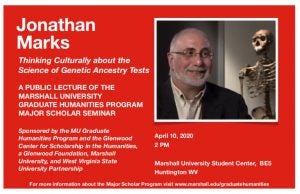 Dr. Jonathan Marks, Professor, Department of Anthropology, University of North Carolina-Charlotte
Dr. Jonathan Marks, Professor, Department of Anthropology, University of North Carolina-Charlotte
Jonathan Marks is a genetic/biological anthropologist whose work on the relationships between science, history, and culture has significantly impacted both academic and public discussions across the sciences and humanities. He is perhaps most well-known for his critiques on race, the genome project, and of ahistorical science. He has also been a leading critic in public debates about direct-to-consumer genetic testing and its marketed correlation to heredity. Understanding, for instance, how and why “I’m 45% Irish” is an invalid scientific claim not only requires deeper knowledge of science, but of history and culture as well. Marks has argued persuasively, then, that understanding human problems are best approached through engagement with a liberal arts that combines, rather than siloes, the sciences and humanities.
2020 Major Scholar Seminar: “Mapping Human Diversity: Genetic Testing, Folk Ideologies of Heredity, and Race.” More information is here.
Read more about Professor Marks’s take on:
- direct-to-consumer genetic testing, from Anthropology Today.
- the ethical issues raised by the Human Genome Project, in the book Bioethics.
- science as a culture and as a “side,” from Marks’s book Why I Am Not a Scientist.
- lots of other related topics, which can be found here.
Interview with Jon Marks from our Fall 2020 Newsletter.
Campus visit:
Friday, April 10, 2 PM: Public Lecture, “Thinking Culturally about the Science of Genetic Ancestry Tests.” Marshall University Student Center, BE5. [live lecture cancelled]
- Per COVID-19 concerns, this lecture was delivered virtually (only) via Zoom on April 9.
Fall 2017
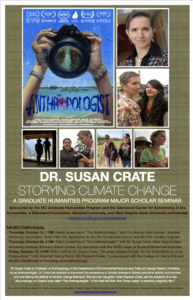 Dr. Susan Crate, Professor, Environmental Science and Policy, George Mason University
Dr. Susan Crate, Professor, Environmental Science and Policy, George Mason University
More about Dr. Crate is here.
Check out the documentary on Crate’s research, “The Anthropologist,” here.
See the trailer, here. And see what the New York Times, the LA Times, and IndieWire have to say.
Major Scholar Seminar: “Storying Climate Change.” More information is here.
See the Charleston Gazette-Mail story about Dr. Crate’s visit to WV here.
Campus Visit – October 2017:
- Thursday, October 12, 7 PM: Public screening of “The Anthropologist,” with Co-Director Seth Kramer. Marshall University, Huntington, Smith Hall 154. Sponsored by the WV Humanities Council and MU Film Studies Program.
- Thursday, October 26, 4 PM: Public screening of “The Anthropologist,” with Dr. Susan Crate. West Virginia State University, Institute, Erickson Alumni Center. Co-sponsored with the WVSU Dept. of Social & Behavioral Sciences.
- Friday, October 27, 4 PM: Public lecture, Dr. Susan Crate, “Storying Climate Change: On the Importance of Local Perspectives.” John Marshall Dining Room, MU Student Center. Co-sponsored with the College of Liberal Arts and the MU Department of Sociology and Anthropology.
Official poster for these events can be downloaded here
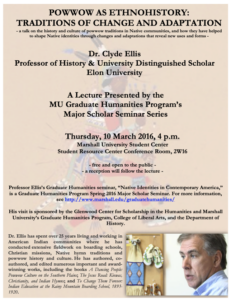 Spring 2016
Spring 2016
Dr. Clyde Ellis, Professor of History & University Distinguished Scholar, Elon University.
More about Dr. Ellis is here.
Major Scholar Seminar: “Native Identities in Contemporary America” More information is here.
Campus visit (sponsored by the Glenwood Center for Scholarship in the Humanities and Marshall University’s Graduate Humanities Program, College of Liberal Arts, and the Department of History):
Thursday, March 10, 4 p.m.: “Powwow as Ethnohistory: Traditions of Change and Adaptation.” Marshall University Student Center, Student Resource Center Conference Room, 2W16. Free and Open to the Public. A reception will follow.
Spring 2015
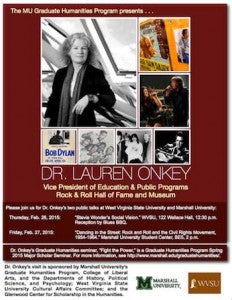 Dr. Lauren Onkey, Vice President of Education and Public Programs, Rock & Roll Hall of Fame and Museum
Dr. Lauren Onkey, Vice President of Education and Public Programs, Rock & Roll Hall of Fame and Museum
More about Dr. Onkey is here. Update: Onkey is currently the Music Director for National Public Radio.
Major Scholar Seminar: “Fight the Power – Can Pop Music Foster Change?” More information is here.
Campus visits (sponsored by Marshall University’s Graduate Humanities Program, College of Liberal Arts, and the Departments of History, Political Science, and Psychology; West Virginia State University Cultural Affairs Committee; and the Glenwood Center for Scholarship in the Humanities):
- Feb. 26: “Stevie Wonder’s Social Vision.” WVSU, 122 Wallace Hall, 12:30 p.m. Reception by Blues BBQ.
- Feb. 26, 7 p.m.: Seminar meeting of “Fight the Power.”
- Feb. 27, 2015: “Dancing in the Street: Rock and Roll and the Civil Rights Movement, 1954-1964.” Marshall University Student Center, BE5, 2 p.m.
Fall 2014
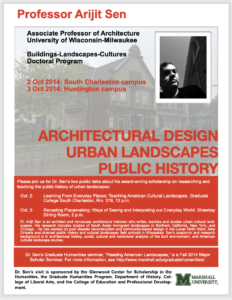 Dr. Arijit Sen, Associate Professor of Architecture at the University of Wisconsin-Milwaukee & Co-coordinator of the University of Wisconsin-Madison and -Milwaukee Buildings-Landscapes-Cultures collaborative doctoral program.
Dr. Arijit Sen, Associate Professor of Architecture at the University of Wisconsin-Milwaukee & Co-coordinator of the University of Wisconsin-Madison and -Milwaukee Buildings-Landscapes-Cultures collaborative doctoral program.
More about Dr. Sen is here.
Check out Dr. Sen’s award-winning “Picturing Milwaukee” project, here.
Major Scholar Seminar: Reading American Landscapes (details here). Check out the course website, “Interpreting the American Scene,” here.
Campus visit (sponsored by the Glenwood Center for Scholarship in the Humanities, the Graduate Humanities Program, Department of History, College of Liberal Arts, and the College of Education and Professional Development):
- October 2, 12 noon, GC 319: “Learning from Everyday Places: Teaching American Cultural Landscapes.” (This lecture is part of the COEPD Brown Bag Lunch Series.)
- October 2, 7 p.m.: Seminar meeting of “Reading American Landscapes“
- October 3, 2 p.m., Shawkey Dining Room: “Recasting Placemaking: Ways of Seeing and Interpreting our Everyday World” (public talk)